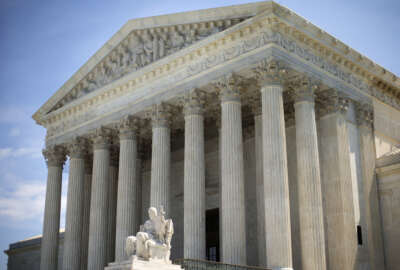
Supreme Court case opens door to major change in vendor oversight law
The nation’s highest court is hearing arguments over a False Claims Act lawsuit that could have long-term implications on federal contractors.
For the second time over the last nine months, federal contractors are paying close attention to the Supreme Court. The eight justices heard arguments on April 19 about a False Claims Act case that could have wide-ranging effects on industry and agencies alike.
On the surface, the case, Universal Health Services, Inc. v. Escobar, has little to do with government contracting. But should the Supreme Court decide for Escobar, every government contract from pens and pencils to professional services to IT hardware to fighter jets could be at risk of violating the False Claims Act.
“Government contractors are following this case closely because the implied certification requirement would be expanded if Escobar wins. That means every bill a contractor submits could be subject to False Claims Act violation,” said Eric Crusius, an attorney with Miles and Stockbridge. “So that means if there are any regulations that a contractor didn’t comply with, and there are myriad of regulations that contractors have to comply with, they could be subject to a lawsuit.”
The Illinois Institute of Technology Chicago Kent College of Law’s Oyez Project has all facts and details of the case. And it’s well worth giving it a quick read.
But long story short, the case revolves around Medicaid payments and whether a subsidiary of Universal Health Services submitted a false claim for allegedly not having properly credentialed medical professionals caring for a patient.
Despite the fact that Medicaid claims are very different from a contract to build, say, a mobile app, Crusius said the concern is the long-term implications of the case because vendors could be subject to lawsuits for not checking a box on a form or for unwittingly saying there wasn’t a problem when in fact there was in another part of the company and thus violating a specific rule in the Federal Acquisition Regulations.
The business community have come out strongly around this case, filing 25 amicus briefs by such organizations as the U.S. Chamber of Commerce and the Coalition for Government Procurement.
The Coalition’s brief stated this case is one of the “most significant contract cases in a generation.”
“False Claims Act punishment for garden-variety breaches of contract — where the government has received the goods or services for which it paid — expands FCA liability far beyond its original purpose: to punish knowing fraud against the government,” the CGP wrote. “Under the implied certification theory as applied by the First Circuit, any breach of contract — whether or not a condition of payment, and whether or not any actual damages result — can render a claim ‘false’ and serve as the basis for FCA liability and its extraordinary remedies. As a result, the pressure on government contractors to settle even meritless FCA lawsuits can only increase. The threat is not theoretical, but real. Last year, the government recovered approximately $3.6 billion in FCA settlements and judgments, increasing its total FCA recoveries since January 2009 to $26.4 billion. FCA defendants faced over 630 new lawsuits filed by qui tam relators. Establishing the implied certification theory applied by the First Circuit in this case as the nationwide standard will only accelerate this trend — no doubt leading contractors to evaluate whether it is in their best interest to remain in the government market. The inevitable result will be less competition — and higher prices — for government procurement customers.”
Now not everyone thinks this change would be a bad idea.
The National Whistleblower Center (NWC) filed an amicus brief supporting the whistleblower, Escobar, in the case.
“The First Circuit’s ruling below most closely reflects the true intentions of the FCA’s drafters, and offers the best analytical framework consistent with the true purposes of the law: the punishment of fraud against the government and restitution for said fraud,” the NWC said in its brief to the court. “The First Circuit’s requirement is to simply ask whether a defendant has knowingly misrepresented compliance with a material precondition of payment — not any precondition of payment. This is precisely the issue the drafters tackled when debating and enacting the FCA. Yet, Petitioner and amici would have the Court believe that a decision in favor of the Respondents would send every government contractor scrambling to its attorneys to check whether it was in compliance with any and every provision governing its participation in a federal program.”
The National Whistleblowers Protection Blog offers some interesting insight into the case as well.
Crusius said he expect the nation’s highest court to decide by June. He said if the court is deadlocked at 4-to-4, the First Circuit court’s decision would stand, causing this new application of the False Claims Act in the northeast region, but not the rest of the country.
Last year, the Justice Department recovered $3.5 billion from False Claims Act lawsuits, including $1 billion from government contractors.
Copyright © 2025 Federal News Network. All rights reserved. This website is not intended for users located within the European Economic Area.
Jason Miller is executive editor of Federal News Network and directs news coverage on the people, policy and programs of the federal government.
Follow @jmillerWFED





